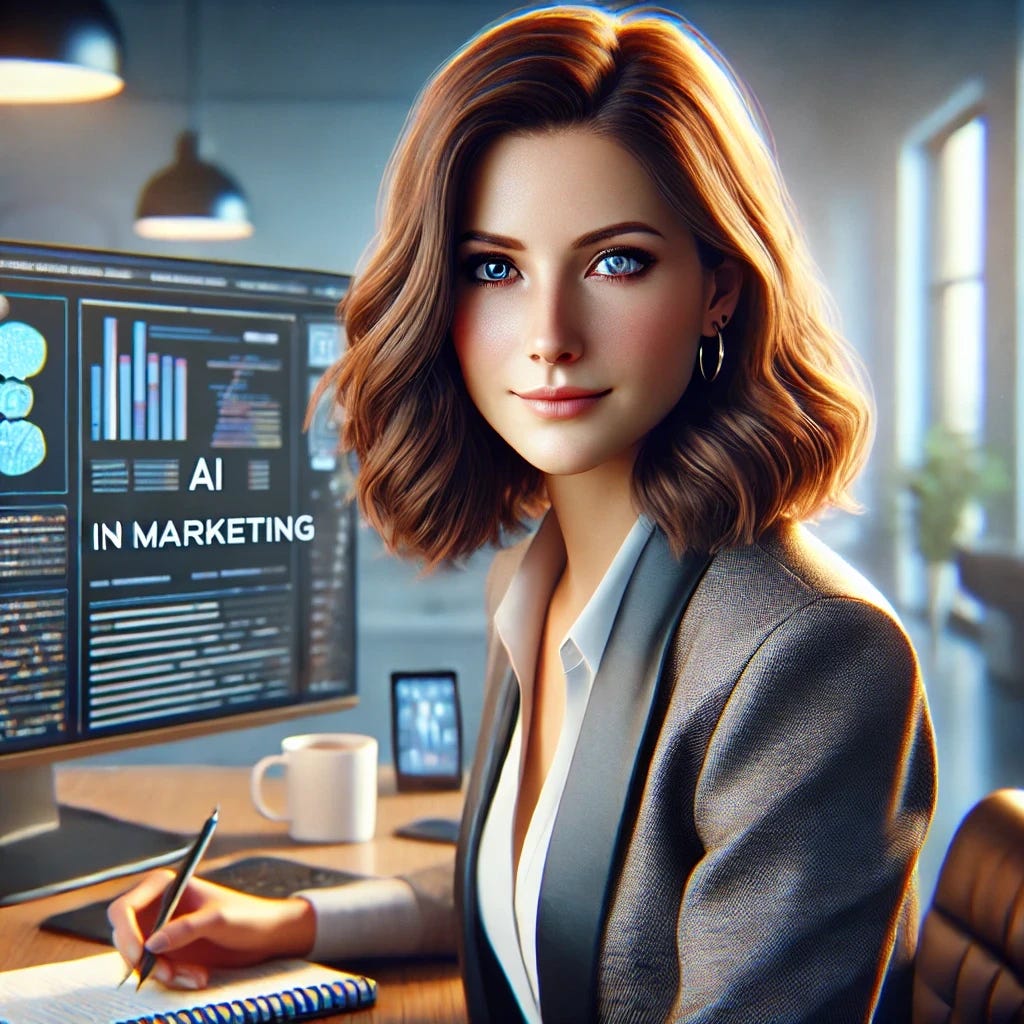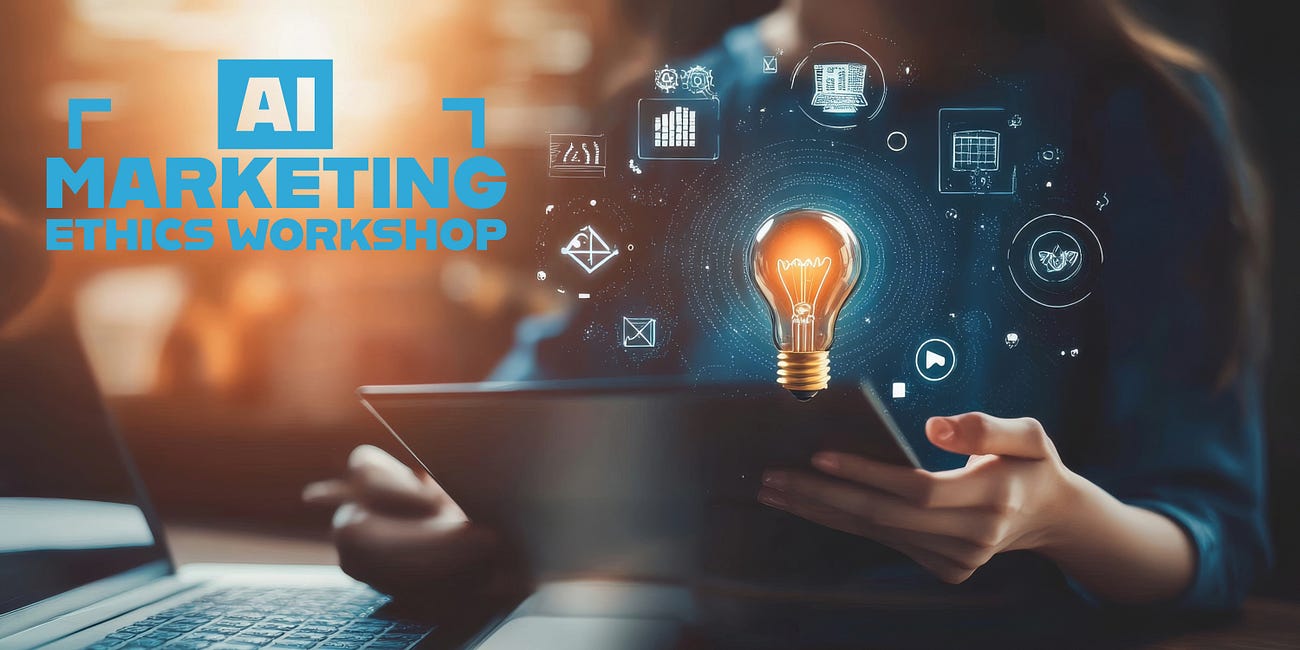From Disruption to Opportunity: One Marketer's Journey Into an AI World
Human marketing at the crossroads
This issue is the first of a two-part series on how marketers can proactively engage with AI, turning it from a career disruptor to an opportunity. It introduces a fictional character, Sarah, a marketing professional. Sarah faces a dilemma: the advent of AI, particularly agentic AI, and its threat to her career and industry. Here’s her story.
Sarah had spent fifteen years building her marketing career. Starting as a copywriter at a local agency, she worked her way up to Marketing Director for a mid-sized tech company, mastering everything from brand strategy to conversion optimization. Her creative campaigns won industry awards, and she took pride in her ability to understand consumer psychology and craft messaging that resonated at a human level.
Then everything changed.
Her company invested in a suite of advanced marketing AI tools. What began as simple automation quickly evolved into sophisticated agentic AI systems that could generate creative content, optimize campaigns, analyze market trends, and even develop strategic recommendations—all tasks once firmly in Sarah's domain.
During a quarterly review, Sarah watched as the CEO praised the AI system's latest campaign, which had outperformed her team's work by every metric. Later that week, she overheard a conversation about "streamlining the marketing department." The message was clear: adapt or become obsolete.
Sarah found herself at a crossroads that many marketers now face. Would she resist the technological tide, become demoralized, or find a way to evolve her role in this new AI world?
The Existential Challenge
The rise of agentic AI in marketing represents a fundamental disruption to the profession. Unlike previous technologies that mainly automated repetitive tasks, today's AI systems can perform increasingly creative and strategic functions:
Generating compelling copy and visual content at scale
Personalizing customer experiences with a level of granularity humans cannot match
Predicting consumer behavior with remarkable accuracy
Optimizing campaign performance in real-time
Synthesizing market research and competitive intelligence
For human marketers, this creates a profound identity crisis. When machines can conceive creative concepts, craft persuasive messages, and make data-driven decisions, what unique value do humans offer? The threat isn't just to jobs but to the very definition of what it means to be a marketer.
The speed of AI advancement compounds this challenge. Marketing AI capabilities that seemed like science fiction 18 months ago are now commonplace—acceleration that gives marketers precious little time to adapt, creating anxiety even among the most skilled professionals.
Furthermore, organizations face ethical dilemmas as they deploy these technologies. AI marketing systems raise concerns about manipulation, privacy, transparency, and fairness. Without human oversight grounded in ethical principles, companies risk damaging consumer trust and brand reputation.
When machines can conceive creative concepts, craft persuasive messages, and make data-driven decisions, what unique value do humans offer? The threat isn't just to jobs but to the very definition of what it means to be a marketer.
The Path Forward: Reinvention Through Integration
Sarah's journey continued with a period of honest self-reflection. Rather than viewing AI as her replacement, she began to see it as a powerful collaborator that could handle routine tasks while freeing her to focus on uniquely human contributions.
She invested time in understanding how marketing AI systems worked—not to become a technical expert but to learn how to direct these tools effectively. She discovered that her years of marketing experience gave her an edge in crafting prompts that yielded better results than those created by colleagues with less domain expertise.
Sarah recognized that while AI excelled at optimization and execution, it still struggled with the nuanced understanding of human emotions, cultural contexts, and ethical implications. She positioned herself as the "human bridge" between AI capabilities and authentic customer connections.
She developed a new framework for her role that emphasized:
Strategic Vision - Setting the overall direction AI systems would help execute, considering business contexts beyond what AI could readily perceive.
Ethical Guardrails - Ensuring AI-generated marketing remained authentic, responsible, and aligned with brand values.
Creative Direction - Providing the spark of truly original thinking that AI could scale and optimize.
Stakeholder Orchestration - Coordinating the human elements of marketing that require emotional intelligence and relationship building.
Continuous Innovation - Identifying new opportunities at the intersection of technology, creativity, and human insight.
Six months later, Sarah found herself not fighting for relevance but leading her company's AI-human marketing integration. Her team was more streamlined but strategic, with each member focused on high-value activities while their AI collaborators handled execution at scale.
For marketers facing a similar journey, Sarah's path offers valuable lessons:
Develop AI collaboration skills by learning to prompt, direct, and work alongside these systems effectively. View them as force multipliers rather than competitors.
Focus on uniquely human strengths, including emotional intelligence, cultural sensitivity, ethical judgment, and authentic relationship building.
Become AI-literate enough to understand capabilities, limitations, and potential biases without necessarily becoming technical experts.
Specialize in AI supervision, quality control, and ethical governance oversight roles.
Embrace continuous learning to stay ahead of automation curves, regularly reassessing which skills remain valuable.
Develop strategic thinking that considers the bigger picture beyond data-driven optimization.
Build cross-functional expertise in marketing, data analysis, business strategy, and ethics.
Create "AI-proof" career paths in roles requiring complex coordination between stakeholders or innovative thinking in rapidly changing environments.
The story of marketing in the age of AI isn't one of human replacement but of human transformation. The marketers who will thrive aren't those who resist change but those who strategically position themselves at the intersection of human judgment and technological capability.
Like Sarah, they will find that what initially appeared as an existential threat becomes the catalyst for the next evolution of their careers—one where they contribute at a higher level by harnessing the power of AI while bringing to bear the uniquely human qualities that no algorithm can replicate.
The future belongs not to marketers fighting against the AI tide or AI systems operating without human wisdom but to marketers who master the art of human-AI collaboration and find their unique place in this new marketing ecosystem.
Next week’s issue gets straight to the point and provides a structured analysis of the current AI marketing landscape, its implications, and specific strategic actions marketers can take. Don’t miss it.
Train your team on AI marketing ethics…
AI Marketing Ethics Training Workshop
Unlock Ethical Marketing with AI: Half-Day Workshop (Zoom/In-Person)










The thing is you have to play with the technology to understand it. For those avoiding doing that - it will put them at a massive disadvantage. I'm sure some think, if I dig in my heels maybe it will go away. It's not!
PS - best of luck on the workshop :)